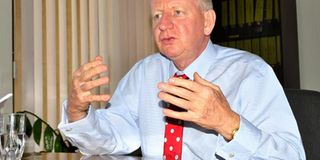I was called the prince of darkness, Chapman says

Outgoing Umeme managing director Charles Chapman speaks to a journalist during an interview. Mr Chapman joined Umeme in February 2009 as the Chief Operating Officer. PHOTO BY RACHEL AJWANG
What you need to know:
Chapman’s reign. Umeme’s outgoing managing director Charles Chapman shares what it’s been like steering a
profitable company that is in the spotlight.
Kampala
In 2010, Uganda was plunged into a power crisis as demand outstripped supply, ushering in an era of
expensive power and load-shedding. At the forefront of all public outcries was the power distributor, Umeme. At
the helm of this company was Mr Charles Chapman, who turns 60 in April this year.
Chapman’s journey at Umeme
He will step down as managing director at the end this month to return to his native country, Ireland. Chapman,
in an interview with Daily Monitor said he had “jumped in at the deep end” and described this period as the most
frustrating.
“The most frustrating time for me was when we had a lot of outages due to lack of generation. That was between
2011, after the elections and 2012. Thermal generation prices went up. Aggreko pulled out. I was like the waiter
coming to the table without all the food. At that time, I was called the prince of darkness,” he told the Daily
Monitor.
Chapman joined Umeme in February 2009 as the chief operating officer. Three months later, he was elevated to
managing director replacing Mr Paul Mare, the first managing director of Umeme. Chapman says his role was to turn
around the company that had poor customer care and wasn’t making enough money.
“The strategy that I came in to do in 2009, was to turnaround the company, make it a very viable entity,
instituting things like prepaid metering, bring the losses down below 28 per cent, make it available for Ugandans
to buy so now Ugandans and East Africans can buy shares in Umeme,” he says.
Challenges
Umeme has been a divisive company. It has been in the spotlight for poor billing, inflated costs, and blamed for
the high tariffs, poor customer care and power outages. Chapman has been in Parliament to explain the ownership
of the company, tariffs, billing, among others. In fact in March 2014, MPs voted to have the Umeme contract
terminated.
However, Chapman says he didn’t panic and viewed these as misinterpretations. “There haven’t been hard times. Why
would there be bad times? I’m lucky. I’ve got one of the best companies in Uganda. I’ve got a staff of 1,400
people; I’ve got contractors, all of them helping me. So yes, there have some frustrating days when someone has
misinterpreted something,” he adds.
Performance
He has been able to make a return for shareholders with profit growing from Shs14.9bn in 2009 to Shs87bn at the
end of 2013. The worst period for the company was in 2010, when the company made losses of Shs2bn.
He is also a firm believer in a system that rewards hard-work and good performance.
“We spend too much time looking at people’s salaries and not what they achieve. All of our staff have the
opportunity to make 30 per cent extra and I would like to see that increase for better customer service,” he
points out.
Prospects for power sector
The outlook for Uganda’s power sector is considered positive as Karuma and Isimba power dams come on board. It is
not yet confirmed whether Umeme will be distributing power from these two dams, but it is certainly setting
itself towards that.
“The next stage is a big one. It needs a younger person and somebody who is going to go with a new strategy for
another five years. There is a new phase for Umeme. There are new investors and new big hydro projects coming up.
Umeme needs to expand,” Mr Chapman says.




